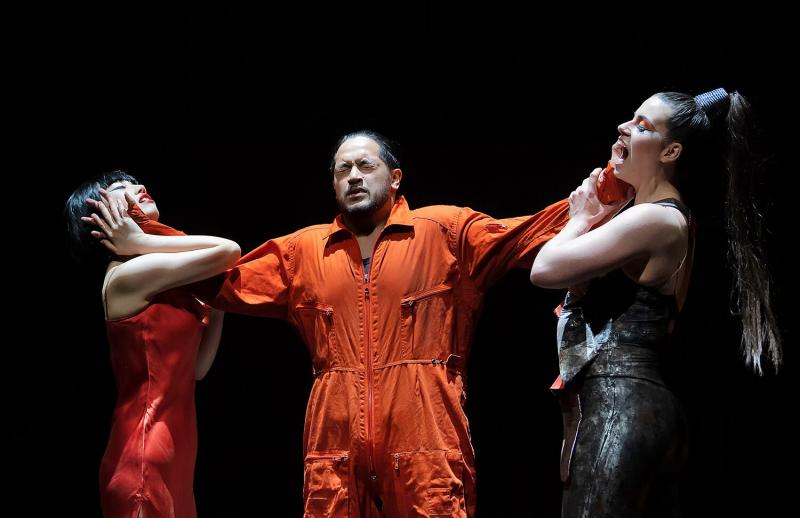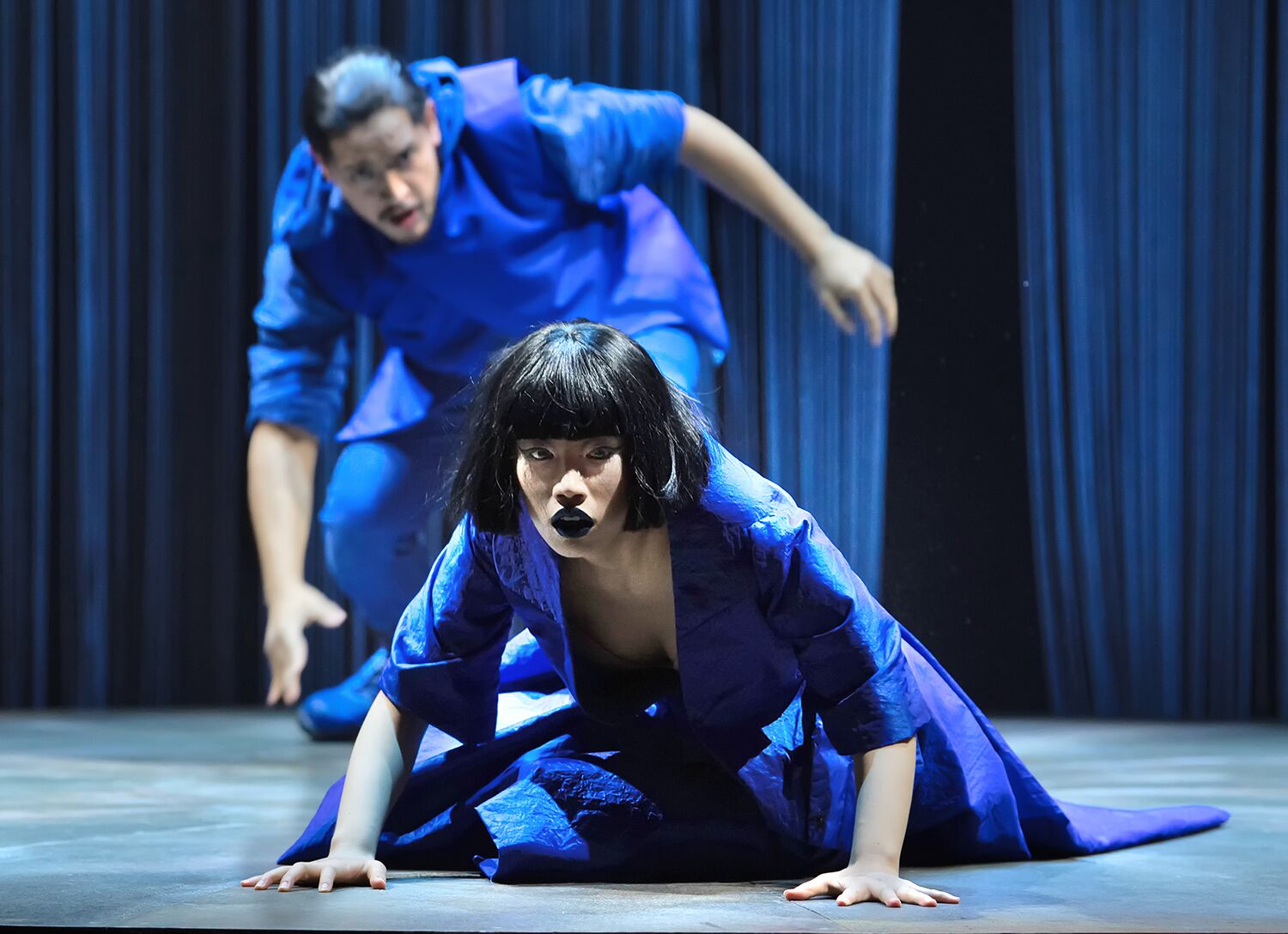Phaedra, Linbury Theatre review - from confusing passion to blazing afterlife | reviews, news & interviews
Phaedra, Linbury Theatre review - from confusing passion to blazing afterlife
Phaedra, Linbury Theatre review - from confusing passion to blazing afterlife
Henze's near-death experience gives this skewed mythology extraordinary life

Leaving a revival performance of Harrison Birtwistle's The Minotaur, a friend asked Hans Werner Henze, also in the audience, that dreaded question: "what did you think?" "Very competent and extremely well performed," came the answer.
A crucial premise makes sense of apparent obscurity. The 79-year-old Henze fell into a coma after completing Act 1, which ends with the deaths of Hippolytus and Phaedra, and recovered to electrify Act 2 with a completely new and different life as the young man is resurrected to become Artemis's King of the Forest. The metamorphosis is recounted by Ovid, but you won't find it in any other operatic treatment of the incestuous passion central to the Phaedra legend. At first, all's confusion; Christian Lehnert's poetry seems cliched, wilfully oblique and over-ornate for an opera libretto, and the only clarity is in the brief scene where Phaedra, accompanied by Aphrodite, visits Hippolytus to be rejected by him at Artemis's urging (Filipe Manu and Hongni Wu pictured below). .  Henze did call the work a "concert opera," so maybe director Noa Naamat, who brought such clarity to the Jette Parker Young Artists showcase last summer, is not to blame. The chief absence is her banishing of the natural world in favour of clinical clarity – a circular revolve with hieratic surrounding steps and platform above. The two humans and their accompanying gods look good in Takis's stylish costuming and Lee Curran's lighting; blue yields to orange in the second act, making Hippolytus more suggestive of a Guantanamo prisoner than a reborn spirit.
Henze did call the work a "concert opera," so maybe director Noa Naamat, who brought such clarity to the Jette Parker Young Artists showcase last summer, is not to blame. The chief absence is her banishing of the natural world in favour of clinical clarity – a circular revolve with hieratic surrounding steps and platform above. The two humans and their accompanying gods look good in Takis's stylish costuming and Lee Curran's lighting; blue yields to orange in the second act, making Hippolytus more suggestive of a Guantanamo prisoner than a reborn spirit.
So much is counterintuitive that in Act One, you can't help thinking of how much more concisely and dramatically Britten tells the Phaedra story in his 15-minute monologue for mezzo. Here the pleasures have to rest in some ravishing music for instrumental couples – the clarinets of the Southbank Sinfonia are especially impressive – and the stylish delivery from the remarkable latest acolytes of the Royal Opera's Jette Parker Young Artists Programme. The Phaedra, stage natural Hongni Wu, sounds more coloratura soprano than mezzo. The impression, as in the recent Linbury production of Handel's Berenice, is that Jacquelyn Stucker, dominatrix Aphrodite, is conversely more mezzo than soprano, though she hits the heights with stunning aplomb: further confirmation that a star is born. Tongan-New Zealander tenor Filipe Manu will be perfect in Britten, and has some of Henze's most text-conscious lyric lines. First counter-tenor of JPYAP Patrick Terry as pure Artemis has to battle against the punchiness of Henze's fleshy chamber-ensemble but offers some golden moments. A shame the mostly silent role of the Minotaur means we don't hear more from true bass Michael Mofidian (pictured below with Manu and Terry).  But does Henze reward their consummate hard work? Ultimately, yes; the exultant release into an afterlife which the composer must partly have experienced as he "died" and was reborn justifies the work. This is Henze's equivalent to Britten's Death in Venice, though it's not concerned so much with the human predicament as the supernatural one. The scoring, its febrile, chameleonic intensity perfectly mastered by Edmund Whitehead, shows a master's touch in every colour, down to celesta and Bergian piano. Stay with it, don't leave at an interval which might seem unnecessary were it not for the stylistic break between the two acts, and it may well haunt your dreams.
But does Henze reward their consummate hard work? Ultimately, yes; the exultant release into an afterlife which the composer must partly have experienced as he "died" and was reborn justifies the work. This is Henze's equivalent to Britten's Death in Venice, though it's not concerned so much with the human predicament as the supernatural one. The scoring, its febrile, chameleonic intensity perfectly mastered by Edmund Whitehead, shows a master's touch in every colour, down to celesta and Bergian piano. Stay with it, don't leave at an interval which might seem unnecessary were it not for the stylistic break between the two acts, and it may well haunt your dreams.
rating
Explore topics
Share this article
The future of Arts Journalism
You can stop theartsdesk.com closing!
We urgently need financing to survive. Our fundraising drive has thus far raised £49,000 but we need to reach £100,000 or we will be forced to close. Please contribute here: https://gofund.me/c3f6033d
And if you can forward this information to anyone who might assist, we’d be grateful.

Subscribe to theartsdesk.com
Thank you for continuing to read our work on theartsdesk.com. For unlimited access to every article in its entirety, including our archive of more than 15,000 pieces, we're asking for £5 per month or £40 per year. We feel it's a very good deal, and hope you do too.
To take a subscription now simply click here.
And if you're looking for that extra gift for a friend or family member, why not treat them to a theartsdesk.com gift subscription?
more Opera
 The Railway Children, Glyndebourne review - right train, wrong station
Talent-loaded Mark-Anthony Turnage opera excursion heads down a mistaken track
The Railway Children, Glyndebourne review - right train, wrong station
Talent-loaded Mark-Anthony Turnage opera excursion heads down a mistaken track
 La bohème, Opera North review - still young at 32
Love and separation, ecstasy and heartbreak, in masterfully updated Puccini
La bohème, Opera North review - still young at 32
Love and separation, ecstasy and heartbreak, in masterfully updated Puccini
 Albert Herring, English National Opera review - a great comedy with depths fully realised
Britten’s delight was never made for the Coliseum, but it works on its first outing there
Albert Herring, English National Opera review - a great comedy with depths fully realised
Britten’s delight was never made for the Coliseum, but it works on its first outing there
 Carmen, English National Opera review - not quite dangerous
Hopes for Niamh O’Sullivan only partly fulfilled, though much good singing throughout
Carmen, English National Opera review - not quite dangerous
Hopes for Niamh O’Sullivan only partly fulfilled, though much good singing throughout
 Giustino, Linbury Theatre review - a stylish account of a slight opera
Gods, mortals and monsters do battle in Handel's charming drama
Giustino, Linbury Theatre review - a stylish account of a slight opera
Gods, mortals and monsters do battle in Handel's charming drama
 Susanna, Opera North review - hybrid staging of a Handel oratorio
Dance and signing complement outstanding singing in a story of virtue rewarded
Susanna, Opera North review - hybrid staging of a Handel oratorio
Dance and signing complement outstanding singing in a story of virtue rewarded
 Ariodante, Opéra Garnier, Paris review - a blast of Baroque beauty
A near-perfect night at the opera
Ariodante, Opéra Garnier, Paris review - a blast of Baroque beauty
A near-perfect night at the opera
 Cinderella/La Cenerentola, English National Opera review - the truth behind the tinsel
Appealing performances cut through hyperactive stagecraft
Cinderella/La Cenerentola, English National Opera review - the truth behind the tinsel
Appealing performances cut through hyperactive stagecraft
 Tosca, Royal Opera review - Ailyn Pérez steps in as the most vivid of divas
Jakub Hrůša’s multicoloured Puccini last night found a soprano to match
Tosca, Royal Opera review - Ailyn Pérez steps in as the most vivid of divas
Jakub Hrůša’s multicoloured Puccini last night found a soprano to match
 Tosca, Welsh National Opera review - a great company reduced to brilliance
The old warhorse made special by the basics
Tosca, Welsh National Opera review - a great company reduced to brilliance
The old warhorse made special by the basics
 BBC Proms: The Marriage of Figaro, Glyndebourne Festival review - merriment and menace
Strong Proms transfer for a robust and affecting show
BBC Proms: The Marriage of Figaro, Glyndebourne Festival review - merriment and menace
Strong Proms transfer for a robust and affecting show
 BBC Proms: Suor Angelica, LSO, Pappano review - earthly passion, heavenly grief
A Sister to remember blesses Puccini's convent tragedy
BBC Proms: Suor Angelica, LSO, Pappano review - earthly passion, heavenly grief
A Sister to remember blesses Puccini's convent tragedy

Add comment